#chantry critical
Text
One of the criticisms I've seen DA players have in response to Anders' actions at the Kirkwall Chantry is some degree of, 'his actions forced innocent mages into a war they had no choice whether or not they wanted to be involved in'.
What a lot of these players seem to miss is this: The mages were already involved. They have been involved since childhood, when their magic manifested.
If you are born a mage in Southern Thedas, you are marked. The Templars will find you, or your neighbors who were conditioned by the Chantry to fear magic will turn you in, and you are brought to the Circle where you are at risk of Tranquility, or Annulment, and subjected to a Harrowing. Your children born to you in the Circle will be taken from you to be raised in a Chantry orphanage (like Wynne's child was). You are not allowed to get married, or start a family, or own land. You are not allowed to leave your Circle ever, unless conscripted to fight in the army (like in the Fifth Blight) or fulfilling some whim or need of those in power (like Malcolm Hawke being made to entertain nobles at a party). You might be thrown into the dungeon and left to starve to death, like the mage child Cole (and other mage apprentices of the White Spire) did. You are at risk of physical and sexual abuse, like the mages of the Gallows were.
Innocent mages were already involved. They were already being killed, they were already fighting for their lives for centuries since the inception of Circles, long before Anders' actions.
Also, in the case of the Gallows specifically, Knight-Commander Meredith had already called for the Annulment as early as the beginning/mid of Act 3. The mages' lives were already in danger, even before the Chantry was destroyed.

Anders tried for six years to make people listen and show how magic is not meant to be feared and can be used for good -- by publishing a manifesto, by providing free magical healthcare in Darktown -- to bring people's attention to the plight of mages and change things for the better. It took the imminent threat of his people being slaughtered wholesale for him to resort to what is aptly titled 'The Last Straw'.
If players want to blame anyone for subjecting mages to a conflict they did not want, look no further than the Chantry and their system of exploitation and oppression over the mages. Put blame on the Chantry for forcing mages into lives they did not choose, and asserting methods of culling and control over them, simply for how they were born. It was the Chantry that gave them no choice whether or not they had a say in staying alive or dying.
And if DA players would still say that the mages could have tried for a more "peaceful route" to alleviate their circumstances (despite seeing how Anders' manifesto, his Darktown clinic, and years of trying to negotiate with Elthina failed and Meredith was calling for Annulment anyway): very rarely do the oppressed win change by pandering to the morals of their oppressors.
Innocent mages were already suffering and being murdered in droves, for centuries. Innocent mages were already involved in this struggle, whether they wanted to be or not. And Anders' actions at the Chantry was like a rallying cry: If we're going to die anyway, then I'd rather die trying to take them down than giving them what they want.
(Also, I have not yet gone into detail on what actually started the mage-templar war, which was the Seekers hiding the cure for Tranquility, and Lord Seeker Lambert's decision to dissolve the Nevarran accord and take the Templars hunting for the free mages across the countryside because he decided dead mages were better than free mages -- because that's a whole separate post.)
#da fandom critical#bioware critical#anders defense squad#da meta#in defense of anders dragon age#anders#dragon age 2#chantry critical#templar critical#elthina critical#anders was right#mage rights#plight of mages#mage-templar war#sometimes the da fandom makes me want to flip tables#my meta
451 notes
·
View notes
Text
Every time I see fics trying to change the Kirkwall finale escalation to something extremely different than canon I sigh really deeply bc most of the time they have Meredith in particular killed and all of a sudden everything is all good, bc Meredith was the sole problem in their eyes. Except she's not. She's merely a symptom of the problem.
If one person has to be singled out to blame for the situation, it is in fact Elthina, and Anders was right to target her. She is in charge of Meredith. Meredith's crimes through the ages are on Elthina's hands bc she allowed them and kept allowing them to happen. But most of all, and this is why just killing off one person wouldn't have worked, it is the system that is the real problem. The system as a whole needs to change. And it is the symbol of that unchanging and powerful system that Anders targets and destroys, to show that it is in fact not untouchable, and at the same time forcing everyone to choose side and giving his fellow mages the chance to fight back instead of getting slaughtered like pigs.
The system is a global problem and this is why local solutions don't work. Killing off Meredith (and Elthina) and having Cullen take charge doesn't work. No matter who is in charge, it doesn't change the fact that the system allows and even encourages attrocities to happen. So for as long as it stands, more Merediths and Elthinas will follow, bringing more suffering and pain.
And we've actually seen a local solution applied to this global problem - Dairsmuid's Circle. Guess how that turned out? Ended up with genocide.
#my posts#anders was right#also this is why vivi/en as a divine doesn't work#keeping the system will just allow it to return to its previous shit state eventually#sorry i wrote this with my ass but my point stands#anti chantry#chantry critical
267 notes
·
View notes
Text
Wynne defending children from the Templars
It’s interesting to reflect on Wynne’s Establishing Character Moment in Dragon Age: Origins, especially in light of the strange whitewashing of the Templar Order in Inquisition as well as her apparently conservative politics. When we encounter her in Broken Circle (our first interaction with her since the brief chat at Ostagar), we see her fighting to protect a group of young children not only from demons but from the Templars -- the very military force that claims to protect them. If she is recruited into the party, in fact, we discover that she had already sacrificed her life for them. She is technically dead/undead and only kept standing due to possession by a spirit of Faith.
As soon as the party enters the door, she’s fearful that the Warden has come to kill them all on behalf of Knight-Commander Greagoir, and depending on player choices/intentions, she may in fact be correct.


Wynne: It’s you! No... come no further. Grey Warden or no, I will strike you down where you stand!
Warden: Wynne - what are you doing here?

Wynne: I am a mage of the Circle. More importantly, why are you here? The templars would not let just anyone by.

Warden: You have children with you.
Wynne: The tower is a place of learning. Young apprentices are always here. Why is that surprising?


Wynne: But this is no time to discuss that. Why are you here? Why did the templars let you in?
Warden: I am helping Greagoir resolve the Circle’s difficulties.


Wynne: Then you do serve the templars as I feared. Do they have the Right of Annulment?
Warden: The Right of Annulment?


Wynne: The order from the grand cleric allowing the templars to completely annul a Circle. Do they have it?
Warden: No, but Greagoir expects it to arrive soon.
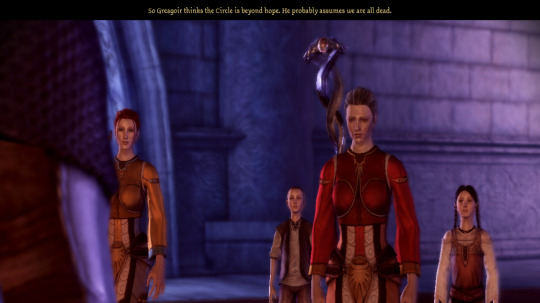
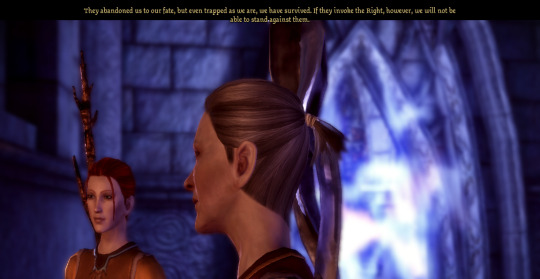

Wynne: So Greagoir thinks the Circle is beyond hope. He probably assumes we are all dead.
Wynne: They abandoned us to our fate, but even trapped as we are, we have survived. If they invoke the Right, however, we will not be able to stand against them.
Warden: It’s nothing less than this Circle deserves.

Wynne: Do these children deserve death too? Will they die by your hand?


Warden: Mages are a danger. If I had a say, you would all be culled.
Wynne: Kill us solves nothing, but with training and education, mages learn to control their powers.
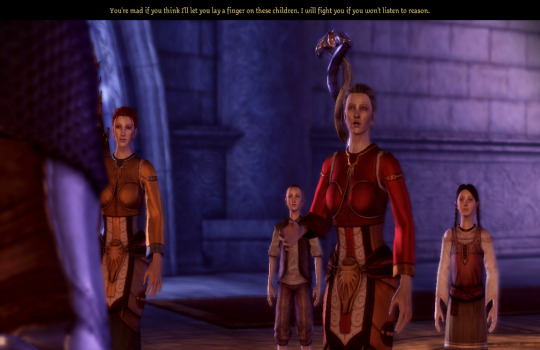
Wynne: You’re mad if you think I’ll let you lay a finger on these children. If will fight you if you won’t listen to reason.
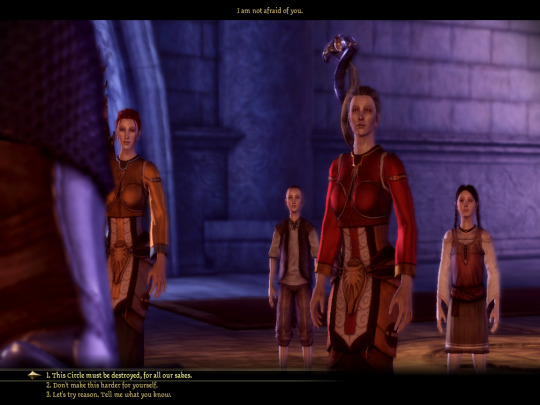
Wynne: I am not afraid of you.
Warden: This Circle must be destroyed, for all our sakes.

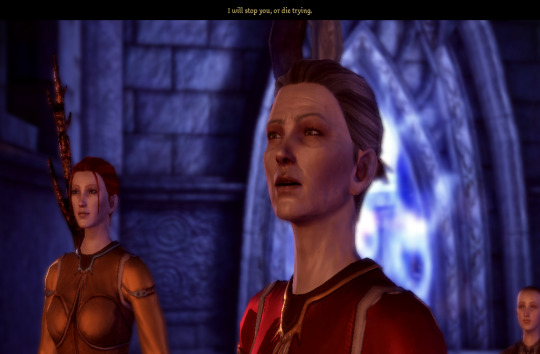
Wynne: If you insist on making war on the Circle, we have nothing more to discuss. It comes to blows, then. I will stop you or die trying.
BONUS - terrified child fleeing from being murdered:
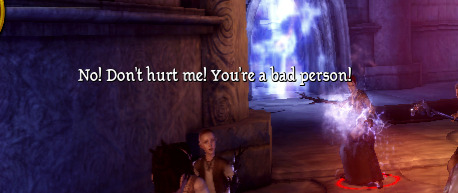
Commentary
While Wynne can be condescending and sometimes preachy in her support for the Circle, her dialogue both here and elsewhere indicates that she has no illusions about the Templars keeping them locked inside.
After all, they imprisoned her in Kinloch Hold since she was a young child, took her own child away from her forever, and threatened to slaughter both her and the other children she was mentoring in her son’s stead. If recruited into the party, she opens up about the despair she felt as a girl when she realized she would be trapped there forever, and it was only by turning to the religious faith that was being forced on all mages in the tower that she began to make peace with her fate. She knows that if the Libertarian Fraternity successfully leads a vote for independence from the Chantry, the Templars will simply kill them all. She even uses the term “genocide” to describe what will happen. She explicitly cites this as the reason why she opposes the independence vote.
The mages will never be free! The Chantry would never allow it. Our only hope for survival is to show them we can be trusted! Don’t you remember what happened to the Circle in Ferelden? Do you want to give the templars another excuse to call for the culling of all mages?
She doesn’t reject freedom for her fellow mages for any personal advantage, throwing others like her under the bus to reap the rewards of brown-nosing. If she wanted any semblance of power or status, after all, she would have accepted the post of First Enchanter (or second-in-line to it) a long time ago. As of Dragon Age Origins, she has consistently rejected the opportunity to become Irving’s successor. As of the end of Broken Circle, if she joins the party and defeats Uldred’s rebels, she still needs to ask for permission just to temporarily leave the tower, despite having proven her loyalty and competence beyond any reasonable doubt both here and over the past thirty or so years of incarceration. It takes helping the Hero of Ferelden save the entire country by defeating the Archdemon to convince the Templars to allow her to come and go freely - an opportunity that, as her own son later points out, no one else has had or probably ever would have in their lifetime (and one, as the only the player knows, that is entirely conditional on player choices).
The only context in which she ever even considers fighting the Templars is when she has no other way of preventing the Templars from killing them all anyways - both during Broken Circle and in the climax of Asunder.
Her politics are, in the end, based on fear.
Not the usual fear of the Other or fear of social change that hamper normal politics, but the completely rational fear, as someone at/near the bottom of the social hierarchy, about what the authorities will do to her and everyone like her if they step out of line. As it turns out, she’s not wrong about what the powers that be are and how they will react - she’s only wrong about the potential for a better future and the rewards of fighting for it.
#dragon age#dragon age origins#dragon age meta#da meta#wynne#wynne dragon age#chantry critical#anti chantry#templar critical#anti templar#circle critical#anti circle#pro mage#dao#broken circle#knight commander greagoir#right of annulment#100#200#300
391 notes
·
View notes
Text
Saw a recent DA confession about Rivain (not gonna touch the post with a 10 foot pole though because the notes are "meh" and I'm pretty careful about my fandom exposure), but I just love seeing people bring it up because it's one of those instances where Bioware tries to make instances like the mage-templar conflict a grey issue instead of black and white, then they drop some horrific lore in passing through a codex or a war table mission and expect people to continue going "b-b-but both sides..."
Yeah, we literally have a matriarchal society outside of Chantry influence (except in their capital). The Circle they have is basically a front. Mages are free to come and go as they please. Elves and Qunari are welcome among them, have settlements there. From the codex and wiki, the Templars honestly don't give a damn about the mages training their women as seers, so long as the seers help them out here and there. In my eyes, it's about as much of a utopia as we can get in the Dragon Age setting.
Then, the Chantry comes in and pulls the Right of Annulment out of their ass because we can't have anything outside of the status quo threatening their influence, right?
Anyways, I'm just amazed how many people seem to miss that and then how many people just blatantly disregard the knowledge when presented with it, and try to make it seem like "The Exception" to the rule, even though the Avaar and the Dalish are other clear examples of mages existing peacefully enough outside of the Chantry’s influence. (Don't get me started on that "3 Dalish Mages" rule which clearly contradicts the lore up until that point.)
#dragon age#pro mage#chantry critical#dragon age fandom critical#tagging that just in case#bluerose rambles#anyways im totally normal about rivain i swear#rivain#the avaar#the dalish
202 notes
·
View notes
Text
understanding why narrative wise the inquistor can't disolve the chantry's power over thedas bc then they would have no power themselves and you'd be unable to do anything in the game doesn't remove from the fact i wish i could tear down the chantry with my bare hands
#ama mumbles#dragon age#chantry critical#inquisition critical#the limits of your narrative being built on political power drawn from a religious organization is agonizing when you hate it as a player#playing anyone who isn't down for the chantry feels like being held prisoner bc it is#let me out! i dont want to contribute to this organization born from a mans desire to conquer the continent and its mythos let me out!!!
63 notes
·
View notes
Text
honestly, can't get it through my head how wild it is that Leliana goes off to play personal assassin for the Fantasy Pope. Like yes I know why she does it but like
Consider you hardened Leliana in Origins. Maybe you even romanced her. Maybe your Warden is very anti-Chantry for whatever reason and tells Leliana to get out of the Chantry. Your Warden goes off to Amaranthine/quests for a cure/whatever and you hear she's now in service to the Sunburst Throne?? Her??? My Leliana????
Even more wild if you hardened/romanced/were anti-Chantry and you get to Inquisition, and the HoF's letter to the Inquisitor laments that they know Justinia's death is hard for Leliana and her faith meant a lot. hello bioware excuse me lol
AND WHAT IF (hear me out here) your anti-Chantry romanced Warden hears she's now the Left Hand and kinda gets invested deep in the Chantry again and your Warden is like ???? what the fuck. breakup saga? maybe???
#trying not to enable myself#ramblings of a mad cat#personal bird posting#dragon age#dragon age inquisition#chantry critical#dragon age leliana
23 notes
·
View notes
Text
I wonder if seeing intensely anti-mage takes on the dragon age lore is so baffling because people just didn't encounter certain parts of the lore/bw weren't clear and concise enough in laying out the bits that might expose Chantry and Circle narratives to be in some cases lying or twisting the truth. Like the nature of the Harrowing for example, which the Circles present as necessary to learn the danger of demons. Hard to take that story at face value once we know a way to reverse Tranquility is known to the Chantry (or its branch at least) and kept secret, and even more so once you realize tranquil mages are essentially property of the Circle and used for stuff like enchanting and as vendors, basically forced labour without pay by severely neurologically (or fantasy equivalent at least) disabled people, who didn't need to become that way but were made that way on purpose. And the other failstate is execution.
Personally I thought it obvious from quests in DA2 that our characters know or find out about the abuses tranquil mages face, and chances are circle mages would have known this even better than lifelong apostates like Bethany, (possibly) Hawke and Merrill. So yeah the idea that the Circles in general and Harrowings in particular are some useful resource to equip mages and not a flimsy pretext to eliminate as much of them as possible is very much challenged in the games proper and the central lore unless you just pay no attention ig.
18 notes
·
View notes
Text
the contagious disease situation in most Circles is probably a nightmare tbh
5 notes
·
View notes
Text
Dragon Age Thoughts: Templar Carver instead of Cullen in DAI
I know I've heard the idea for switching Cullen and Samson, but I was drifting off into my 'what if world' dragon age edition and was imagining that if Carver became a Templar in DA2 it could have made sense for him to be in the Cullen role. Even if he was relatively fresh he could have 'proven himself' at DAII endgame. Cullen rose in rank similarly quickly after DAO. It would have felt better to have a Templar who was not on board with the Chantry line and had him be very critical since they went the other way with focusing on loyalist Mages. It would have been more balance if, you know, they were actually not trying to push you towards a specific narrative.
78 notes
·
View notes
Text

CONFESSION:
I'm a Catholic school survivor so while I loved Dragon Age 2, the chantry stuff really bothered me because I dealt with people like Elthina and Petrice in real life. Many kids dealt with mental and physical abuse by the instructors. They got away with so much and were never held accountable when I was a kid. And yes they are being held accountable now but its taken forever. I hate the corruption
101 notes
·
View notes
Text
Chapter 4 of fuck if I know anymore
I tried. I swear I tried to end it at Chapter 3. It was a great ending, it implied things all worked out, our heroes were successful!
But it did not end.
It's all about Vows, I think. Most members of the Chantry swear their vows to the Chantry itself as an institution or to a person or to the current Divine. It seems Sebastian was one of those rare types who actually pledged his vows to the Maker. Now, now that he's followed such a vow to the letter, his Vow of Charity upheld by holding the lives of others above his own soul, that Chantry will fault him for it. Because his soul should be worth more than mere lives. Because their own souls are worth more than mere lives, right?
Because if one Brother is setting this kind of example then what does it mean for the rest of them? Because if Grand Cleric Elthina, master of sitting back and letting the Templars win and then taking political credit claiming it 'just', cannot set an example like this... Then what exactly is the Maker's work?
Chantry critical machinations ahead. Also Justice ate a dude again but it's offscreen. I'm sure they deserved it.
#fanfiction#whatever i'm going to end up naming my da world state#dragon age 2#i am a horrible person#chantry critical#sebastian vael#cullen rutherford#grand cleric elthina
3 notes
·
View notes
Text
The Andersmance as a narrative of hope
One thing I've noticed while in the Dragon Age fandom is the prevalent interpretation of the Anders romance as a tragedy, or a romance that's inherently tragic. Anders acts behind Hawke's back, destroys the Kirkwall Chantry no matter what choices the player makes, the player sees this as a huge betrayal, and — despite having romanced Anders, and/or being mage-sympathetic — they decide to execute or banish Anders as punishment for his 'crime'. Tears are shed; it's all dramatic and tragic and angsty.
While I sometimes appreciate tragedies, I would like to posit a different perspective: The romance with Anders is a story of hope; a story of standing up to insurmountable odds and overcoming them. The romance with Anders can be approached as one with a happier ending, where Hawke and Anders are the heroes.
Before I elaborate, a disclaimer: These are my own opinions. I understand some players prefer the Andersmance as a tragic romance, and to each player their own. I am not here to dictate the choices you should make in-game or how you approach your playthroughs, merely to present a different perspective to one I've seen very often.
Also, this post is critical of the rivalmance with Anders — more on that later.
The Andersmance as a narrative of hope relies on two perspectives:
Firstly, the Chantry is an authoritarian institution who are the antagonistic force that the heroes need to oppose and take down. There is plenty of meta that explores and supports this.
Secondly, Anders is a heroic character:
He is a healer who set up a clinic providing free healthcare for the marginalized and downtrodden people of Kirkwall who otherwise have gone overlooked by their own Chantry.
He let a Spirit of Justice into his body, simply to help Justice continue to exist in the physical world when he would have otherwise disappeared into the Fade.
He regularly risks his safety and security by helping mages escape abuse in the Gallows and have a chance at freedom via the Mage Underground.
These are all acts of someone who is kind and compassionate, and, yes, heroic.
He is not a villain who needs to be stopped. He is the hero of the story who needs help and support as he challenges systematic oppression. He's Katniss Everdeen standing up to the Capitol; he's Luke Skywalker opposing the Galactic Empire.
Hawke is that supportive pillar, that safe harbor, that source of unconditional love for Anders in his times of struggle. "The one bright light in Kirkwall" who stands by Anders' side as they face insurmountable odds together.
In World States where Leliana becomes Divine Victoria, this means Hawke and Anders' struggles were not in vain. Through their actions, they sparked a series of events that culminated in the abolition of the Circles.
Anders' prophetic speech about how, "Ten years, a hundred years from now, someone like me will love someone like you, and there will be no Templars to tear them apart" carries so much more weight, because loving Hawke gave him hope for a better future that Anders actually gets to witness in his lifetime.
Do you know how powerful such a love story is?
Their love literally changed the world for the better.
They loved each other, that love gave them courage, and now future generations of mages are free to find a love as strong and precious as the one Hawke and Anders share.
Of course, the condition of this is that Hawke loves and supports Anders wholeheartedly, meaning that this obviously takes the Friendship route for the romance. The rivalmance where Hawke downplays Anders' struggles, breaks Anders' spirit, undermines Anders' confidence, and tries to convince Anders that his cause is needless has no part in this narrative of hope; in fact, I would go so far to say that Hawke is the villain in that version of the story.
Personally, stories of hope have always strongly resonated with me. I gravitate towards stories where our protagonists are presented with challenging obstacles (whether they be internal, external, or both), and things may seem bleak at first, but they bravely carry on, and by the end of the story the characters have made themselves better people, and/or made the world a better place.
Anders and Hawke had many chances to turn away and ignore the plight of mages and just get their own happy ending, but they didn't — they carried on, because they were the heroes, and they knew all mages deserved to be free as they were.
#andersmance#handers#anders x hawke#hawke x anders#dragon age 2#anders#anders dragon age#anders positivity#dragon age romances#da meta#my meta#chantry critical#da fandom critical#rivalmance critical#andersmance as a narrative of hope#i don't buy into bioware's narrative where they frame anders as a villain not for one minute#anders is so compassionate and brave and heroic#anders is protagonist material
234 notes
·
View notes
Text
The Chantry explosion being Hawke's catharsis
One handers (doesn't have to be handers but imo it works best like that) take/headcanon about the end fo DA2 that I haven't seen before is that the Chantry explosion is a catharsis for Hawke, that it feels both freeing and relieving to him. I'll elaborate. This is all about pro-mage (probably red) Hawke btw.
Hawke is not exactly a man with a plan. Things just happen to him (Varric approaches him for the Deep Roads expedition, the qunari try to take over Kirkwall, etc). He only makes decisions when a situation is presented to him, but never really tries to steer events in a certain way unprompted. In Act 3 Hawke has a reputation and social sway due to being Champion. But those don't mean much bc politically (and in terms of actual power in the form of a templar army) Elthina and Meredith are in charge, and nobody can do anything against them. Not really. And not in the violent police/dictatorship state that Mereedith is running.
Hawke gets blackmailed into helping Meredith, and would've probably gotten blackmailed again and again until he was forced to do something he would hate himself for, or refused and Meredith had him removed from the picture. The latter would've caused a stir among the people but ultimately nothing would've changed bc Meredith has Kirkwall by the throat. Hawke would've been accused of something (blood magic, harbouring apostates, doesn't really matter) bc in Act 3 the templars are killing people left and right for whatever. Hawke just has way more protection bc of his status, but that's not infinite.
So Hawke in Act 3 is stuck between a rock and a hard place. But he's not a planner. He doesn't even know where to start in order to fix the situation. Red!Hawke specifically realizes that war is inevitable, but he doesn't know how to bring everything to a boil, especially not to a situation in which those against the templars would have as close to equal grounds as possible for a fight. But Anders does. Anders has a plan and Hawke knows that. So he waits for Anders to present him with a situation.
And when the Chantry goes boom, that situation is finally presented. The choice is clear. And Hawke feels relief bc now he knows exactly what he needs to do. It's catharsis bc it's the relief from years worth of stress. The feeling of constant pressure, uncertainty and frustration - all released now. It's time to act.
#handers#hawke#anders#anders was right#my posts#chantry critical#anti chantry#anti templar#this got longer than i intended but i hope someone reads it
287 notes
·
View notes
Text
Did you know that there are whipping posts in the Kirkwall Gallows?
They’re rather easy for players to miss. You can see them in the background during The Last Straw (Act 3), and as early as Act 1 (and continuing into Act 2), Circle mages can be heard complaining, “Don’t talk to me. The templars will give me thirty lashes if they see me speaking to a civilian.” During the quest A Noble Agenda (Act 3), a woman reports seeing a mage cousin “whipped, half-starving” while pleading for mercy from a literal “death squad.”
In-universe, however, the whippings in the Gallows appear to be common knowledge. During Repentance (Act 2), we can see a whipping post (the exact same model observed in the Gallows later on) being used for sexual roleplay in the Harimann Estate in Hightown.
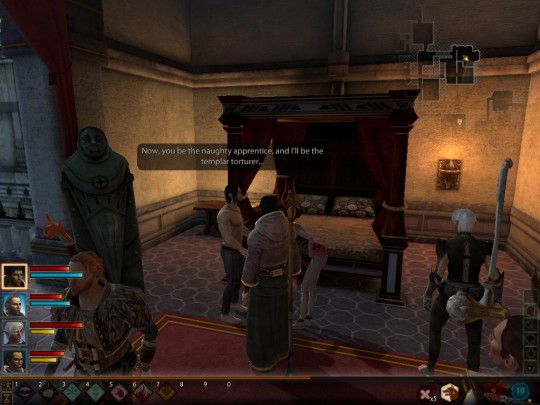
Lord Harimann: Now, you be the naughty apprentice, and I’ll be the Templar torturer.

It’s Played For Laughs here of course, but it really says something that citizens of Kirkwall know about Templar abuses in the Gallows and just how awful conditions are there — including the use of whipping posts. This isn’t even the only instance in the game of random NPCs referring to the severity of the repression and the rampant cruelty.
For example…
During The Destruction of Lothering (Prologue):
Hawke: I heard someone call this fortress the Gallows. Is it a prison?
Guardsman Wright: Used to be, back in the Imperial days. They kept slaves here until the rebellion. Now the templars run it and use it to lock up their mages. Guess not much has changed.
Outside Lirene’s shop, during Tranquility (Act 1):
Refugee: Hey! We heard you in there. Asking about the healer. We know what happens to mages in this town. And it ain't gonna happen to him.
Speaking to the sister of a Templar during Enemies Among Us (Act 1):
Macha: Keran was always so devout, so idealistic. He was so proud when the templars accepted him. I pleaded with him not to join the Order, but he wouldn't listen. You hear dark rumors about the templars and Knight-Commander Meredith. And now my brother is gone.
Hawke: (“Are templars so bad here?”) In Lothering, some templars died protecting villagers. I never heard any dark rumors.
Macha: And those are the stories my Keran adored. But it is not like that here, serah. There is a growing darkness in the order. They prowl the streets in packs. Hunting. And now, they say their duties put them above us, that they have the right to... take people from their homes. It is frightening.
Hawke: (“Tell me about Meredith”) What do people say about Knight-Commander Meredith?
Macha: Oh, she has many admirers. They laud the service she does in keeping the mages in check. But others say she is terribly fierce and utterly without pity. That she sees demons everywhere. It is dangerous even to whisper such things.
During Wayward Son (Act 1):
Feynriel: Look, I know it's different in other kingdoms, but here... no one helps Circle mages. Anything the templars don't like, you get the brand.
During Underground Railroad (Act 2):
Hawke: Helping apostates is dangerous. If the templars caught you...
Mistress Selby: One of my sisters is a mage. A gentle child, so generous. She was made Tranquil last year. Templars claimed she was a danger. Now... it's like she's not there. That shouldn't be forced on anyone.
In Sundermount (Act 3), if Feynriel escapes to Tevinter:
Arianni: I hear the templars have grown more abusive of the mages in Kirkwall. I'm glad Feynriel is no longer subject to their whims.
By the Docks, any Act:
Unnamed Woman: I feel sorry for the mages sometimes, you know? What a terrible thing, to be used by everyone.
Knight-Captain Cullen even admits that the common folk suspect them and have become hostile towards the Templars. There’s this exchange in Act 1:
Hawke: The templars defend us all.
Cullen: That's a surprisingly unpopular viewpoint. It used to be that templars were welcomed wherever they went—for defending people from dark magics. Now the townsfolk are as likely to slam their doors as offer us a bed. The image of the poor, chained apprentice is a powerful one. And one the mages are more than willing to exploit.
Then there’s the codex for the Mage Underground (available in Dissent, Act 2), written by Cullen:
Every Circle in Thedas suffers from individual mages who rebel and attempt to flee… Until now, I have never served anywhere that the populace does not fully cooperate in hunting these rebels. Here in Kirkwall, citizens actually help rebel mages escape.
In World of Thedas vol. 2 (p. 173), from a note dated 9:25 (set between Acts 2-3) from a mage of the Hossberg Circle in the far away Anderfels:
I have heard that in the Kirkwall Gallows, mages are locked in their cells with barely room to stretch, let alone exercise. I can promise you that any mage of the Anderfels would be stark raving mad after a week of such treatment... No wonder Kirkwall has such trouble with blood mages.
Even relative newcomers recognize the situation right away. For example, when speaking to Grand Cleric Elthina in the Chantry (Act 1):
Hawke: Why are Circle mages here kept in a Tevinter prison?
Elthina: Ah. So soon you take an interest in our problems. The short answer is, it was a building. A large one. Should it have sat empty? The Chantry found a use for what was once a horror. It is the nature of men to move on and forget the past. Even your Blight will be a distant memory in our lifetimes.
Isabela: “Once a horror?” Yes, I'm sure it's filled with flowers and sunshine and happiness now.
Even Fenris, who supports Meredith’s policies, immediately notices (first entry into the Gallows, Act 1 or 2):
Fenris: I've... heard about the Circle of Magi outside of the Imperium, but I've never been in one. This seems more like a prison. I wonder if it's more effective than the Circle I know.
Given all this, it’s hard to believe that the people in power in Kirkwall don’t know (or at the very least suspect) what’s going on — more likely, they simply just don’t care.
Or perhaps they think it’s acceptable. As Cassandra says of the Seekers of Truth in Inquisition, “We knew what was happening at Kirkwall, where the mage rebellion began. We looked into reports of Knight-Commander Meredith’s harsh treatment of her charges years earlier. But we found so many shocking cases of magical corruption, it was decided her actions were justified.”
#dragon age#dragon age 2#chantry critical#anti templar#anti chantry#kirkwall#the gallows#kirkwall gallows#lord harimann#da2#meta#da meta#da2 meta#dragon age meta#cassandra pentaghast#cullen critical#templar critical#circle critical#whipping post#feynriel#mage underground#wayward son#enemies among us#elthina critical#tranquility#rite of tranquility#100#200#300
433 notes
·
View notes
Text



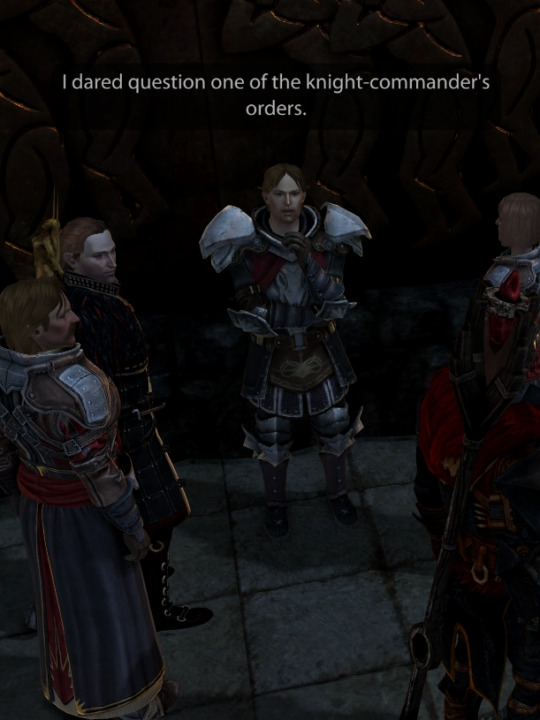
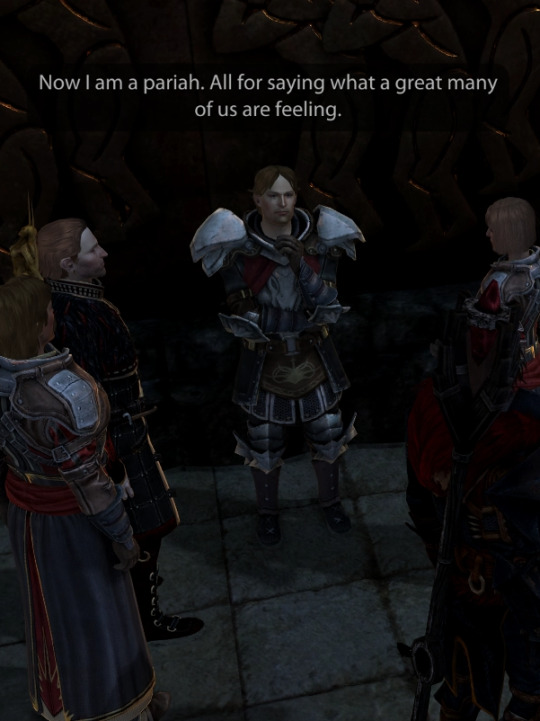
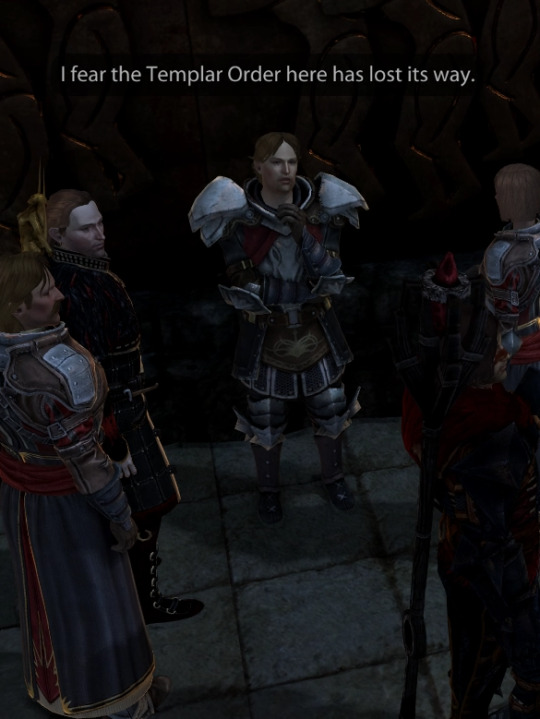




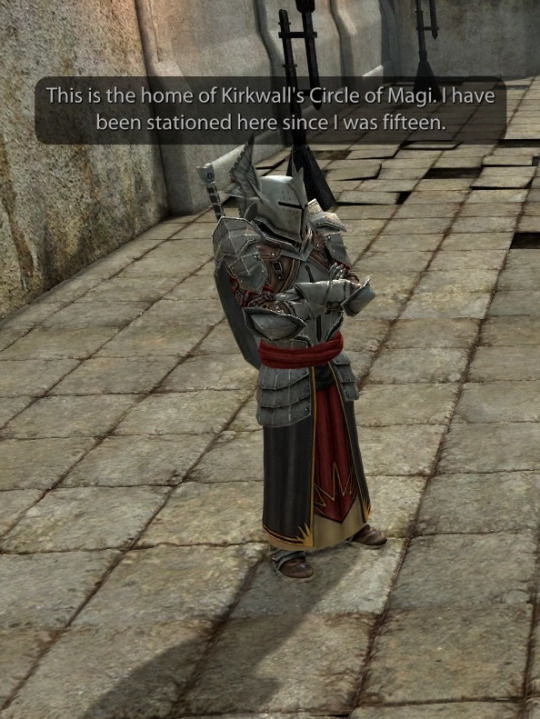
I think this is my first time going to the Gallows in Act 3 for this playthrough. Then again, that's from what I remember because I took a break from playing, but this is all sooooo normal. Nothing unnerving here. Kirkwall is just an extreme example, of course. The mage-templar conflict is a morally complex one, hardly a black-and-white/cut-and-dry issue. Let's go consult with Elthina again. Maybe her thoughts and prayers will work this time. 🥺
#dragon age#dragon age 2#da2#templar critical#cullen critical#chantry critical#bluerose screenshots#bluerose rambles#bluerose games#if you can't tell#the last bit was sarcasm#sorry for the salt#i just cannot imagine defending templars at this point#especially since they spilled the beans that the Right was already called for in advance
25 notes
·
View notes
Text
When Bann Teagan and his sister-in-law Arlessa Isolde insist that one of the two surviving Grey Wardens absolutely has to go get an urn that’s supposedly filled with the ashes of a woman who was burned alive a thousand years ago, I wish that the Warden could point out that the world is in the middle of a fucking Blight and that maybe, just maybe, it might be more important for her to keep amassing armies to fight the Archdemon causing the Blight and save the entire world rather than go haring off after a relic to save one comatose old man.
At the moment, my mage Warden is complying because Teagan and Isolde are credulous idiots who have the power to toss her in Castle Redcliffe’s dungeon if she doesn’t obey them. (Also, there is no dialogue option for the player character to say, “Oh, HELL no!”) She is, however, convinced that transforming them into toads would benefit the entire country. No one expects toads to be intelligent enough to govern a region, so there would be no actual difference. And toads, unlike people, can’t talk.
Solona does not know any spell that can turn fools into toads, but at this point, she is aching to learn one.
I know Doylistically that the relic will turn out to exist, will truly contain Andraste’s ashes, and will have magical healing powers. There would be no reason otherwise to make the Urn so critical to the story. But it’s established canonically--by a sister of the Chantry, no less!--that Ferelden is overflowing with fraudulent relics. And Teagan and Isolde have no in-universe reason to think that the Urn of Sacred Ashes is real beyond “One researcher said so.” They want it to be real, sure, but wanting something to be real and knowing that it could be are two totally different things.
Sorry. I don’t hate Dragon Age: Origins, I promise. I’m just thoroughly sick of syrupy Andrastianism and NPCs who believe in it unthinkingly.
I want to play as a Dragon Age game as an atheist. Preferably one who drives the Chantry crazy.
39 notes
·
View notes